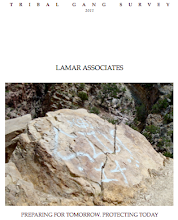 |
| Captain George Sword, center Library of Congress Prints and Photographs Division |
It may have been an issue of jurisdiction that inspired many akicitas to overcome their distrust of the government and sign up with the tribal police. Horse thieves from outside the tribe were preying on the Lakota horses, and without jurisdiction, there was nothing the akicitas could do. After hundreds of horses were lost in 1879, dozens of men signed up for the police. George Sword, also known as Man Who Carries the Sword, ably led the police for thirteen years, before retiring and becoming a tribal judge. Sword served his tribe as a medicine man, holy man, camp administrator and war leader. He felt his work as police captain continued this work, helping his people transition to the new era.
As head of the Pine Ridge Indian police, Captain Sword commanded 49 men, including many recruits from outside the tribe and maintained his traditional appearance and duties while serving.








